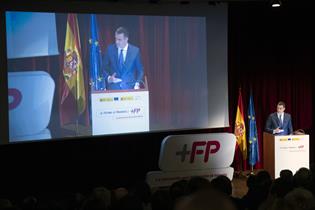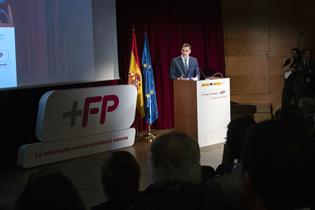The President of the Government opens a forum on Vocational Training with 400 education and business professionals
Government of Spain promotes debate on new prestigious type of Vocational Training recognised across Europe
President's News - 2018.11.13
Images of the President of the Government at the inauguration of the forum on Vocational TrainingPool Moncloa/Jorge Villar2018.11.13
Prado Museum, Madrid
The Minister for Education and Vocational Training, Isabel Celaá, and the Minister for Employment, Migration and Social Security, Magdalena Valerio, also attended the event organised by the Ministry of Education and Vocational Training, which forms part of the strategy to promote a new prestigious type of Vocational Training capable of playing a decisive role in modernising the productive system and being recognised across Europe. To achieve this, the Spanish Government has included Spain in the European Qualifications Framework and thus ended an anomaly whereby it was the only European country lacking this recognition.
In his speech, the President of the Government said that Vocational Training is a priority for the government and that this priority is reflected in the Agenda for Change, in which improving education is the main objective. Pedro Sánchez went on to add that his government will improve Vocational Training by focusing on two aspects: strategic vision and social commitment. "Strategic vision that will allow us to ensure that this training adapts to reality in order to strengthen our productive system, with a commitment to qualified talent and quality jobs", he said.
 Pool Moncloa/Borja Puig de la BellacasaThe improvement will also be based on the social commitment to work towards Vocational Training that combines technical and professional skills with others of a personal and social nature, capable of helping students integrate into society as active, critical and committed citizens. "Citizens who, with motivation, contribute to the self-esteem of their country", said Pedro Sánchez.
Pool Moncloa/Borja Puig de la BellacasaThe improvement will also be based on the social commitment to work towards Vocational Training that combines technical and professional skills with others of a personal and social nature, capable of helping students integrate into society as active, critical and committed citizens. "Citizens who, with motivation, contribute to the self-esteem of their country", said Pedro Sánchez.
The new Vocational Training "already forms part of the changing times being experienced in Spain", he said. The Government of Spain is committed to it as part of a State policy focused on three basic objectives: firstly, improving productivity, competitiveness and business innovation; secondly, supporting the employability of young people and adults; and thirdly, reactivating the social elevator towards attractive and well-remunerated intermediary qualifications.
Data from the OECD reveal that the number of students enrolled in Vocational Training in Spain has increased by 57.4% in the last decade from 462,492 in the 2007-2008 academic year to 804,829 in 2017-2018. Nonetheless, the percentage of students choosing Vocational Training stands at 12% of all students, half the figure in the other OECD countries.
To improve these figures, the Government of Spain is promoting a new type of Vocational Training that is more modern, flexible, innovative and international, capable of quickly responding and anticipating needs in the productive model. According to various studies, half of all jobs that will be needed in Europe will be intermediary qualifications.
Vocational Training is also essential for combating one of the major blights on the education system: the school drop-out rate. With the reform being led by Minister Isabel Celaá, Vocational Training will offer new alternatives and possibilities for returning to the education system.
Hand-in-hand with the social stakeholders
The meeting is being attended by: representatives from leading companies in most professional sectors; business and trade union organisations; education authorities from the regional governments; chambers of commerce; civil society organisations; and teaching staff from throughout the country. Against this backdrop, social stakeholders and especially companies will be working alongside education representatives from the outset. The companies will work with the authorities to identify the professional qualifications needed by the labour market in each professional sector and develop suitable training, as well as reduce the time currently required between designing a qualification and seeing it rolled out into society.
Another of the reforms to be carried out will involve updating the current offer of educational qualifications, with a special focus on the Economy 4.0. Qualifications will be reviewed and specialisation courses will be designed to update them. As an initial measure, Pedro Sánchez had already announced in October that the Government of Spain will allocate six million euros to a first round of funding before the end of the year, aimed at innovation projects at Vocational Training centres throughout Spain in partnership with companies, organisations and entities.
The Government is already working with companies to incorporate new professional qualifications related to advanced technologies, smart systems, Economy 4.0 environments and 5G communication networks. Other areas being tackled include biotechnology, sustainable development, electronic mobility, cyber-security, the circular economy, 3D printing in everyday fields, environmental health, occupational risk prevention, occupational health and socio-healthcare.
Processing of new qualifications
 Pool Moncloa/Borja Puig de la BellacasaThe Ministry of Education and Vocational Training has begun to process five new Higher Professional Aeronautical Studies qualifications, which will be followed by other Professional and Higher Professional level qualifications in various fields. Work has also already begun to promote the first two specialisation courses in Cell Cultures and in Audio-description and Subtitling. As regards distance learning, the Government has launched a partnership with the regional governments to review and update the resources already available to the ministerial department for this type of training, which allow 110 vocational education diplomas to be taught remotely.
Pool Moncloa/Borja Puig de la BellacasaThe Ministry of Education and Vocational Training has begun to process five new Higher Professional Aeronautical Studies qualifications, which will be followed by other Professional and Higher Professional level qualifications in various fields. Work has also already begun to promote the first two specialisation courses in Cell Cultures and in Audio-description and Subtitling. As regards distance learning, the Government has launched a partnership with the regional governments to review and update the resources already available to the ministerial department for this type of training, which allow 110 vocational education diplomas to be taught remotely.
The Ministry of Education and the Ministry of Employment are jointly developing initiatives to speed up the identification of new professional qualifications through a new section of the Qualifications Watchdog, as well as to simplify the accreditation of skills acquired through work experience. They are also developing an integrated vocational guidance system capable of helping students and professionals make training and professional decisions at each stage of the process.
Non official translation





